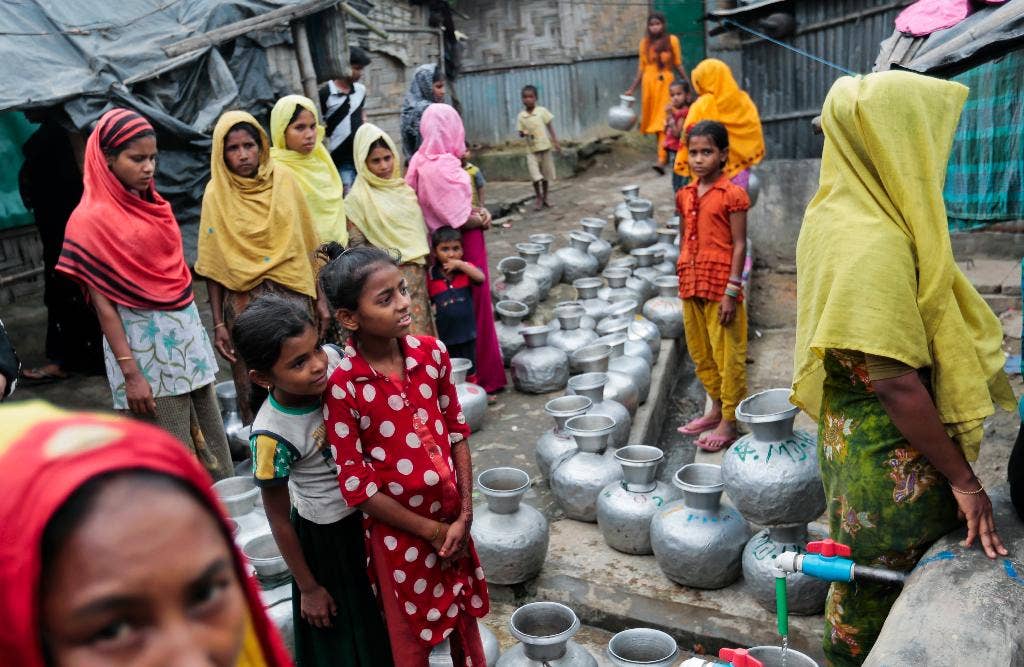
[ad_1]
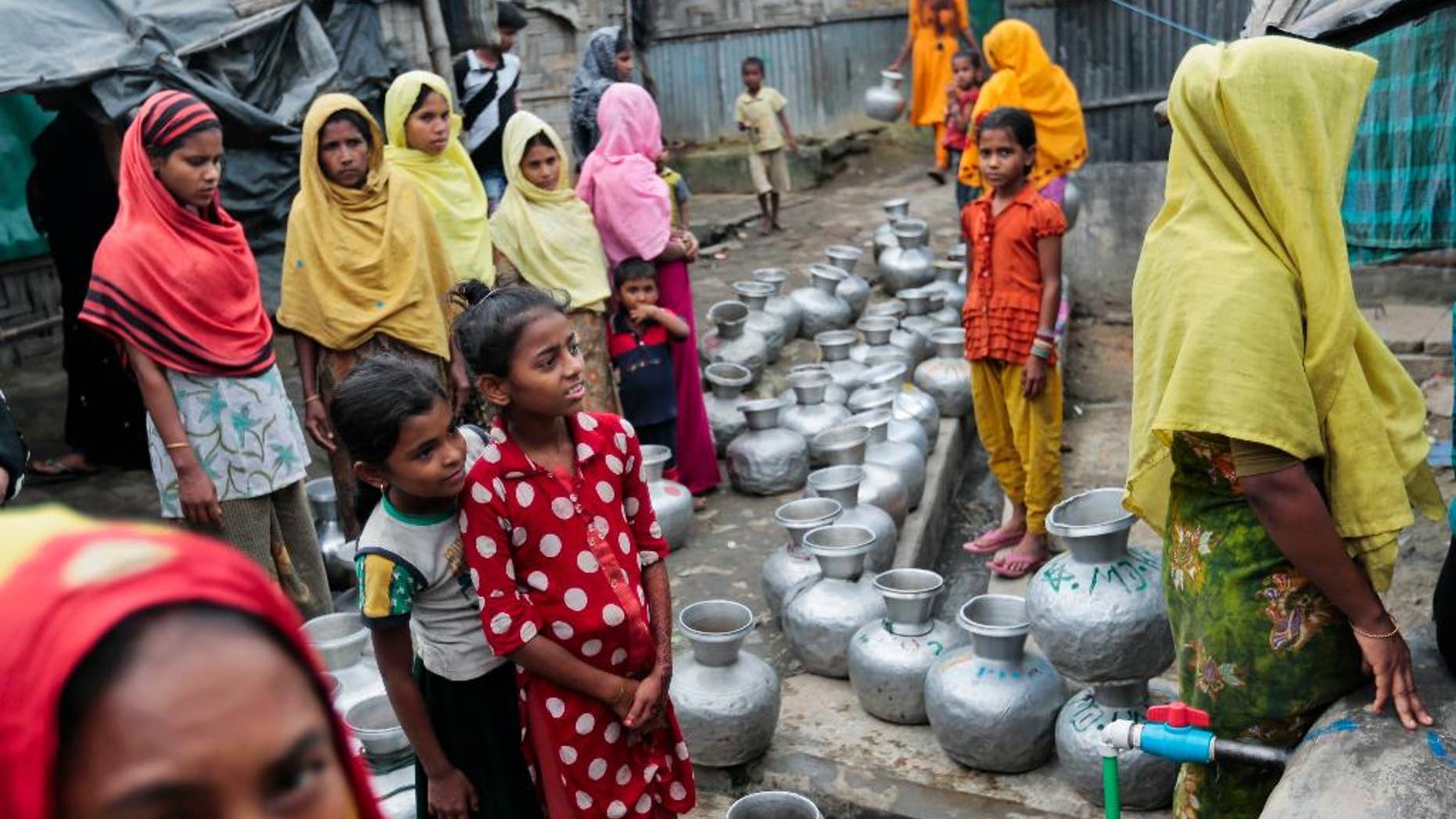
In this Dec. 3, 2016, file photo, Rohingya women and children wait to collect water at the Leda camp, an unregistered camp for Rohingya in Teknaf, near Cox’s Bazar, a southern coastal district south of Dhaka, Bangladesh.
(The Associated Press)
Despite increasing international pressure to end a horribly brutal campaign against a mostly Muslim Rohingya minority, the government of Burma is doubling down on the narrative it’s guilty of nothing more than trying to stop the growth of Islamic “extremism.”
“The root cause of this humanitarian issue is because of the Arakan Rohingya Salvation Army (ARSA) – the Muslim terrorist group,” U.N. Ambassador Hau Do Suan told Fox News in a recent interview. “They attacked against the government in Rakhine State in October 2016 and again in August 2017. This humanitarian problem was ignited by those terrorist attacks.”
That explanation has been dismissed by many Western countries and human rights groups, some of whom now believe a repatriation effort to return Rohingya who had fled to neighboring Bangladesh in the face of ethnic cleansing – perhaps even genocide – is a potentially disastrous recipe for further persecution.
UN RIGHTS RESOLUTION WOULD CONDEMN ABUSES AGAINST ROHINGYAS
The Rohingya have “received no assurance of their physical safety,” said Kristina Arriaga, vice chair of the U.S. Commission on International Religious Freedom (USCIRF), who warned against members of the group returning to Burma, given there “have been no guarantees of protection for their properties, livelihoods or basic human rights, including religious freedom.”
USCIRF has called on the U.S. State Department to continue imposing sanctions – many of which were rolled back by the Obama administration – targeting specific “abusers” in the Burmese military, as well as non-state actors.
Suan argues the country’s “Bengali Muslim population problem” has been going on since the country achieved its independence from Britain in 1948. He insisted security forces have been responding to a well-founded threat from such Rohingya militants, who attacked police posts in Rakhine state, rather than methodically targeting local people.
He called charges of ethnic cleansing “totally insane,” and stressed his government is advocating a “peaceful and voluntary return of the refugees back to their place.”
Suan has condemned the U.N. for only listening to “one side” of the story, and not recognizing the injustices undertaken by ARSA. He also asserted that in the wake of the “terrorist attacks,” all peace efforts already in-motion were subsequently “hampered.”
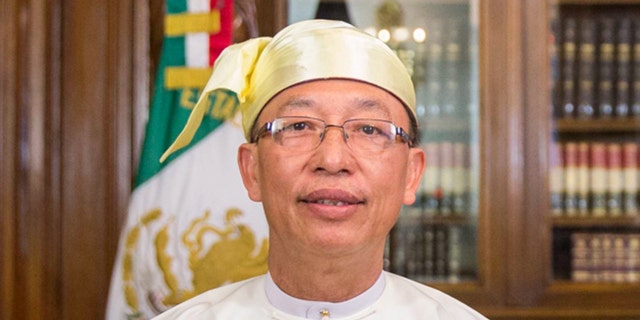
Permanent Representative to the UN for Burma, officially known as Myanmar, Hau Do Suan
(Flickr)
But the likes of Amnesty International has turned up troves of evidence of an “orchestrated campaign” of systematic abuses by security forces. Amnesty has also acknowledged a Rohingya armed group wielding guns and swords – known indeed as ARSA – is responsible for at least one, or potentially two, massacres of up to 99 Hindu women, men and children, in addition to “unlawful killings and abductions of Hindu villagers” in Rakhine State, beginning in August 2017.
“Accountability for these atrocities is every bit as crucial as it is for the crimes against humanity carried out by Myanmar’s security forces,” said Tirana Hassan, Amnesty’s Crisis Response Director.
Though the Rohingya have lived in Burma for generations, they are denied citizenship, and not even recognized as an ethnic minority. Rather, officials refer to them as Suan did – the “Bengali Muslim population.”
BANGLADESH RESCUES ROHINGYA ILLEGALLY HEADING FOR MALAYSIA
Suan argued the Muslims in Rakhine state were brought in by the British colony in the late 19th Century, to farm the area. A second wave came in 1971 and 1972, when then-East Pakistan, now Bangladesh, fought Pakistan for its independence, said Suan. “So these people they call Rohingya people are Bengali stock, and speak the Bengali language,” he claimed.
The ambassador also claimed the “invented” Rohingya name “is not recognized by anyone,” and was created only to “attract the support and attention of the Muslim world.” But the U.N. is among those who in fact do recognize the Rohingya, seen now as one of the world’s most persecuted minorities. The Rohingya are victims of beatings, rape, and systematic slaughter, according to human rights groups.
Since August of last year, an estimated 10,000 Rohingya are reported to have been murdered, according to the Doctors Without Borders group. And among those victims were 730 children under the age of five.
More than 100,000 Rohingya homes are also reported to have been burned to the ground. And at least 750,000 people, according to Amnesty International, have been forced over the border to Bangladesh. More than 200,000 Rohingya were already displaced in the bordering country, having been in camps for years out of fear to return.
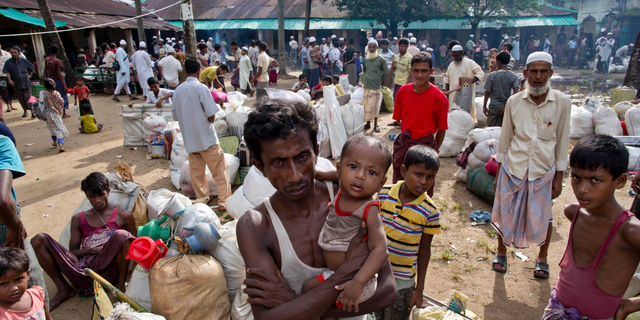
In this Monday, Oct. 2, 2017, file photo, newly arrived Rohingya Muslims from Myanmar prepare to leave a transit shelter in Shahparirdwip, Bangladesh. A team of independent investigators examining alleged violence and killings in Myanmar that caused hundreds of thousands of Rohingya Muslims to flee their homes have issued a searing critique of the United Nations’ own operations in the country just as bloodshed erupted in August 2017. (AP Photo/Gemunu Amarasinghe, File)
A report released in July by advocacy group Fortify Rights alleged the flight of some 700,000 Rohingya was sparked by a planned campaign of large-scale slaughter, rape and village burnings in Rakhine. Beginning in October 2016, the report claims military and local officials “methodically removed sharp tools that could be used for self-defense,” and halted aid to the community.
BURMA’S KAREN REFUGEES FACE DWINDLING AID, STRUGGLE WITH DEPRESSION AND SUICIDES
Efforts by local journalists to investigate the alleged crimes have been met with severe punishment. In June, Reuters journalists Wa Lone and Kyaw Soe Oo were sentenced to seven years behind bars for “breaching the country’s official secrets act” after being accused of obtaining classified documents. Their trial was largely viewed as a sham by the international community.
But on Friday, in a rare case of good news, the incitement case against three other journalists was withdrawn. Eleven Media editors Kyaw Zaw Lin and Nayi Min, and chief reporter Phyo Wai Win, who were arrested in October but allowed out on bail, were cleared – at least for now. They were accused after an article raised questions about government minister Phyo Min Thein, a close confidant of civilian leader Aung San Suu Kyi.
The government is also accused of targeting other non-Buddhist religious minorities, including those in the Christian community. Violence has risen as well in the Christian Kachin community, with horrific tales of church burnings, mass killings, and persecution.
Suan attempted an explanation for that issue as well.
“Kachin people rose against the central government from 1962. The government at that time announced Buddhism as the state religion, and they did not accept this policy,” he said. “Since then, they have been fighting the government.”
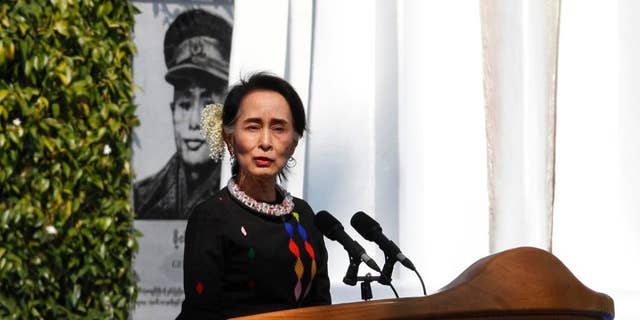
Myanmar State Counsellor Aung San Suu Kyi, standing by a portrait of her late father and national hero Gen. Aung San and the Panglong monument, delivers a speech in Feb., 2017. (AP Photo/Thein Zaw)
(The Associated Press)
He dismissed any notion government forces were the aggressors. “These things have been going on for so many years, but there is no business for religious discrimination. This is not logical.”
A statement provided to Fox News by Myanmar’s Washington Embassy also said “national reconciliation and achieving peace are the priorities of the current civilian government,” and claimed the government is “ready to address issues related to human rights violations in all parts of the country that come up with concrete evidence.”
But the United States and human rights groups have been very reluctant to accept the government’s account of what’s happening with the religious minorities.
When Burma was under a complete military rule, the U.S. and most other Western governments heavily sanctioned the regime. But in 2016, Nobel Peace Prize laureate Suu Kyi’s party was voted into power – she serves as State Counselor. Yet the military wing, under terms of the constitution, still rules key ministries, including immigration and home affairs.
U.N. investigators last month called on the Security Council to refer Burma to the International Criminal Court, and has explicitly mandated for the country’s officials and top generals to face charges. But Suan said that Suu Kyi – who is yet to formally meet with member of the Trump administration – would very much like the opportunity to talk to the president, or a senior official.
“She would be glad to meet with anyone. The U.S. and Myanmar have had a very long and good relationship,” he added. “We would like to maintain that friendly relationship.”